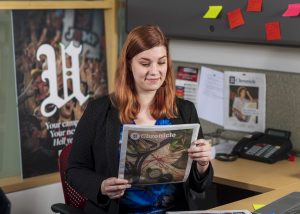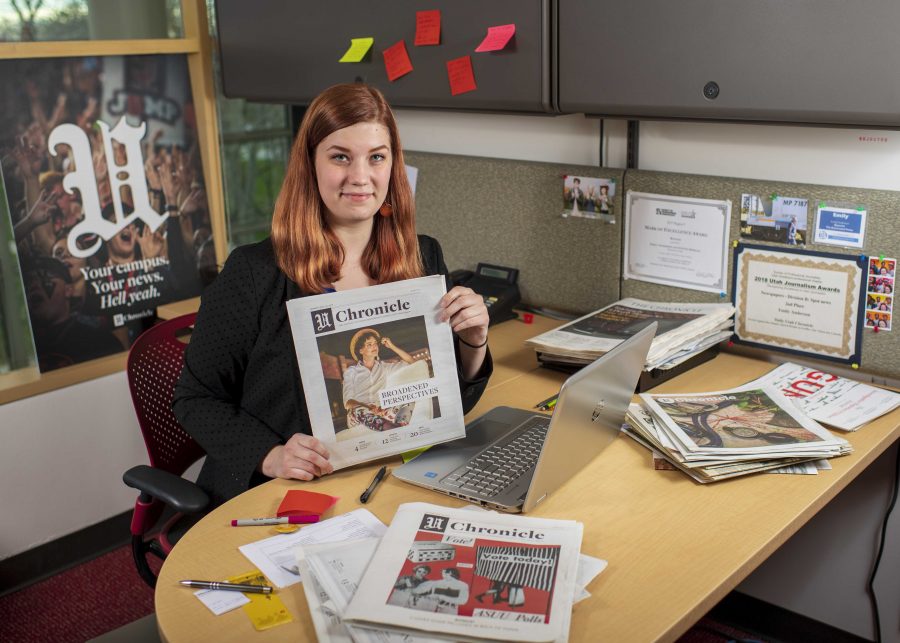For incoming Editor-in-Chief Haley Oliphant, the upcoming year will be all about teamwork.
Oliphant never expected to find herself in The Daily Utah Chronicle offices. She came to the University of Utah with performing arts aspirations, and spent the first two years of her collegiate career majoring in musical theater.
“I have always loved writing, but I come from a family of performers. My dad is a professional opera singer and performing was always just in my blood,” Oliphant said. “I was a theater kid in high school and I was too scared to stray from what I knew when I came to college. But I had always loved my English classes, reading, writing, analyzing and telling stories. When I started college, I had to do something familiar, and theater was familiar for me.”
It wasn’t until she met Madge Slack, the current arts desk editor at The Chronicle, that Oliphant considered writing. She accepted Slack’s offer to write with her as an intern at the arts desk, and, when Slack was promoted to arts desk editor, tagged along as her assistant. Although she had to be nudged into applying, Oliphant credited the moment she began working at the arts desk for leading her to her new position as editor-in-chief.
“As I stepped into the role of assistant arts editor, I found that I loved editing even more than I loved writing,” Oliphant said. “I loved helping people cultivate their own stories and strengthen their own writing. My time here has helped me realize that I would rather be a writer and editor than a performing artist, so I credit The Chronicle for reigniting my passion to write. I switched my major from musical theater to English because of it.”
Oliphant was soon promoted to digital managing editor for the 2018-19 academic year — her fourth year at the U. In this jump, she went from managing online content and writing for the arts desk to running The Chronicle’s website and social media accounts, increasing SEO, training new staff on the software used at the paper and editing all online content produced by each desk. Experiencing these three tiers of leadership, Oliphant said, has had a major influence on her planning for The Chronicle under her term as editor-in-chief.

(Photo by Kiffer Creveling | The Daily Utah Chronicle)
“Being in different positions has helped me see how disconnected we are sometimes as a paper,” she said. “When I was an arts writer, I had no idea who the editor-in-chief was, I didn’t know anyone else except the people on my desk, and I know that’s the case for a lot of writers. Even when I was the assistant arts editor, I didn’t really know who the other editors were. Being in the digital manager role this year has shown me how many moving parts we have, and how difficult it is to produce a really high quality paper when we all sit in our separate sections.”
Oliphant plans to strengthen the collaboration effort in the office across all of the desks, from sports to news to arts to opinion, to create what she called “one unified Chronicle.” In the past, The Chronicle has been divided into print and online sections, and held editorial boards along those divisions. Oliphant wants to merge these worlds, and have everyone on staff, from the copy-editors to the interns, on the same page.
To implement this new leadership and communication style, Oliphant plans to lean on her management team — incoming Digital Managing Editor Josh Petersen and Print Managing Editor Justin Prather, as well as all of the desk editors they selected.
“I was looking for people who were willing to work together,” Oliphant said. “I know that there are issues that can be avoided with more communication. I really focused on candidates’ ability to collaborate and listen, and really just as sappy as it sounds, for kind-hearted individuals. This is a tough job, and we need to be strong and resilient, but we also need to be kind. As I’ve been at The Chronicle, and even just at the U, I’ve learned that kindness isn’t always letting people walk over you. I can still be kind and be a firm leader, and I think that’s important to have that balance. I needed people who were going to be working hard, but were still empathetic.”
Oliphant supposed that she has “always been kind of a sap,” valuing kindness above almost all other character traits. This quality, though, is to her essential to being a skilled journalist, especially at The Chronicle. In light of the various tragedies that have occurred on campus this past year, from the murder of Lauren McCluskey to sexual assaults, racist propaganda and other various events, Oliphant believes good coverage is reliant upon an empathetic reporter.
“This year’s events were some of the hardest for The Chronicle to tackle,” Oliphant said. “They were tragedies, and it was our job to tell those stories and to do it in a delicate way. I think we did a pretty good job of that. Even more than that, all of us, even those who didn’t write the articles ourselves, learned the skills to be more emphatic as reporters and editors, how to comfort each other when we have to cover these really hard subjects. I love that The Chronicle does its best to tell stories that are hard to tell. Sometimes that’s really difficult to write about, not only because of the heaviness of the content, but also gathering information, writing sensitively.”
Even with the most difficult and painful stories, Oliphant said that The Chronicle’s coverage stands out.
“We definitely have a perspective on this campus as students that other publications don’t,” she said. “That’s what sets us apart and makes our reporting on the same incidents more valuable in some ways.”
Oliphant will be joining a long list of women to hold the position of editor-in-chief, but still felt a bit nervous about taking the leadership position.
“Though The Chronicle has a history of women being editor-in-chief, which is a wonderful legacy that I’m grateful to be a part of, there’s still a stigma about being a woman in charge. I’ve seen it before for women in leadership roles here, where women in leadership roles weren’t respected. That was my biggest fear about stepping into this position, that I wouldn’t be respected in my role,” Oliphant said. “I think with the leadership staff I have now, though, that won’t be the case. And even if something like that does come up, I know that I have a staff and peers that will stand up for and with me, so I’m not as afraid of that anymore.”

She also reflected on examples of female leadership she experienced within the office, starting with the outgoing editor-in-chief, Emily Anderson.
“We’ve had a lot of good examples of leadership, but Emily Anderson sticks out to me. She has done such an amazing job this past year, and tackled difficult reporting and events with such strength and grace. It’s amazing to watch. I want to emulate that strength she has as a leader, and her insatiable curiosity. She seems to always be learning something that I should be learning, and she’s this endless wealth of knowledge.”
Oliphant went on to acknowledge Kim Brenneisen, the print managing editor during the 2017-18 academic year, for her confidence and ability to stick up for herself and command her leadership position.
“And of course, Madge Slack, who I owe all of this to,” Oliphant said. “She’s the kind of person who if she wants to do something, she’ll just do it. She is fearless and a go-getter and she doesn’t care what the limit is, she doesn’t set limits on herself. I want to emulate all of these women and their strengths during my time as editor-in-chief.”
Now, with a qualified, kind and strong staff, a well-thought-out collaborative leadership plan and an ever-burning passion for journalism and writing, Oliphant is ready to tackle the upcoming year and to attract as many new writers, designers and editors to the team as possible.
“The Chronicle has opened a new path for me in journalism. Because of The Chronicle, I know that I want to build a career working with words and with stories, and whether that’s in journalism or in a literary position or something else,” Oliphant said. “The Chronicle has been a wonderful gateway to a multitude of opportunities that I couldn’t have imagined. We’re an independent student newspaper, but we’re also teaching students how to be journalists. And, even if you don’t want to be a journalist necessarily, it’s still an excellent opportunity to learn interpersonal and writing skills. If I had realized sooner what a difference The Chronicle was going to make in my life, I would have joined my freshman year. They took what little experience I had writing and turned it into something amazing. That’s what we do at The Chronicle.”



